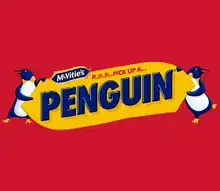 | |
| Owner | McVitie's |
|---|---|
| Country | United Kingdom |
| Introduced | 1932 |
| Tagline | P...P...P...Pick up a penguin! |
| Website | Official website |
Penguins are milk chocolate biscuits filled with biscuit and chocolate cream. They are produced by Pladis's manufacturing division McVitie's at their Stockport factory.
History
William Macdonald founded Macdonald Biscuits in Glasgow in 1928. After seeing some biscuits from Antwerp he was inspired to create a chocolate covered biscuit with a chocolate cream sandwich in the centre.[1] They were first produced in 1932, and became a McVitie's product a few years after MacDonald was taken over by United Biscuits in 1965. Each wrapper has a joke or "funny fact" printed on it and imaginative, often humorous designs featuring penguins that often pastiche famous works of art.
The Tim Tam, produced by Arnott's in Australia and first sold in 1964, was based on the Penguin.[2] Occasional media references include tongue-in-cheek debates over which is the superior biscuit.[3][4]
During the 1980s, the Penguin brand became known for their television advertising slogan "P...P...P...Pick up a penguin!”[5]
In October 1996, Penguins were the subject of a court case between Asda and United Biscuits, who accused Asda of passing off their own brand "Puffin" biscuits as part of the Penguin brand. In March 1997, the court found in favour of United Biscuits regarding passing off, but found that Asda had not infringed the Penguin trademark.[6]
United Biscuits had been criticised for continuing to use trans fatty acids in the cream filling of Penguins.[7] By December 2007, United Biscuits began to advertise the absence of trans fats from Penguins, having removed the ingredient from this product line.[8]
Wrapper
The back of the wrapper typically has a joke.[9]
Types
There are three variations of the biscuit:[10]
- Milk Chocolate
- Orange
- Mint
Former Flavours
- Toffee[11]
- Dark chocolate
Spin off brands
In June 2003, McVitie's produced several "sub brands" or variations of the Penguin biscuit: Penguin Chukkas, Wing Dings, Flipper Dipper, Splatz and Mini Splatz. These variations were accompanied by a £5 million promotional campaign.[12] In January 2008, McVitie's also produced Penguin triple chocolate wafers.[13]
Notes
- ↑ Foreman, Carol (2004). Made in Scotland: Household Names that began in Scotland. Edinburgh: Birlinn. ISBN 9781841582894.
- ↑ Kirsty Needham (2003-04-18). "Branding rivals will never take the biscuit, says Mr Tim Tam". The Sydney Morning Herald. Retrieved 10 October 2006.
- ↑ "Tim Tam vs Penguin". 2003-01-12. Retrieved 11 October 2006.
- ↑ Mike Adamson (2005-08-26). "Cricket -The Ashes 2005 - Fourth Test, second day — Over-by-over: afternoon session". London: Guardian Unlimited. Retrieved 11 October 2006.
- ↑ Ellyatt, Michael (1 January 1999). "McVitie's Penguin — How Role Reversal led to a Reversal of Fortune". International Journal of Advertising and Marketing to Children. 1 (1): 43–53. doi:10.1108/eb027595. ISSN 1464-6676.
- ↑ Karen Fong (1997-05-01). "The problem with look-a-likes: Penguin v. Puffin". Rouse & Co. International. Archived from the original on March 26, 2006. Retrieved 5 October 2006.
- ↑ "United biscuits". tfX::the campaign against trans fats in food. Archived from the original on 27 September 2006. Retrieved 5 October 2006.
- ↑ "United Biscuits website". Archived from the original on 14 December 2007. Retrieved 14 February 2008.
- ↑ Murray, Beth (29 May 2021). "Here are 10 truly terrible jokes only found on the back of Penguin biscuits in honour of National Biscuit Day". www.scotsman.com. Retrieved 6 May 2022.
- ↑ "Penguin". McVities. Archived from the original on 11 February 2018. Retrieved 18 December 2017.
- ↑ "Penguin | McVitie's UK". mcvities.co.uk. Retrieved 2023-08-29.
- ↑ McVities 'chukks' £5m behind Penguin brand, Food & Drink Europe, 3 June 2003. Retrieved 6 October 2006.
- ↑ "McVitie's to launch Penguin Triple Chocolate Wafer bar". www.talkingretail.com. 16 January 2008. Retrieved 20 February 2020.